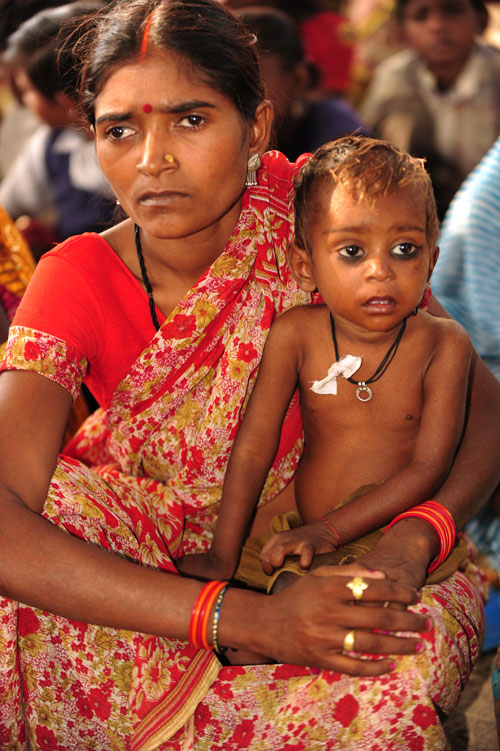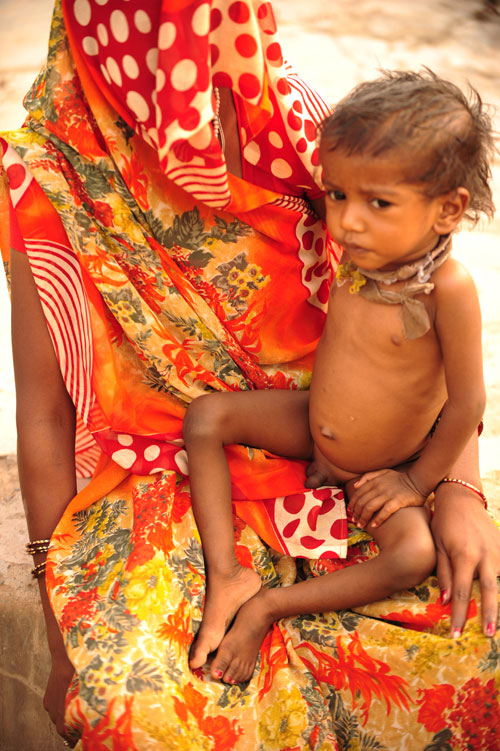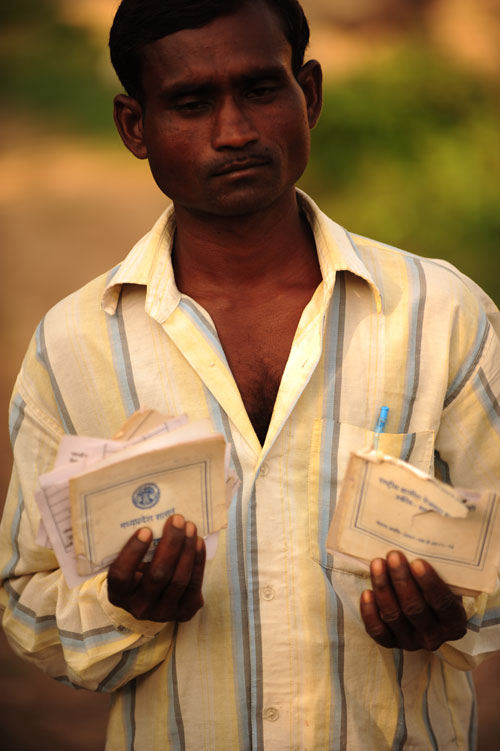
Dear friends,
The Asian Human Rights Commission (AHRC) has received information from Samaj Chetna Adhikar Manch regarding eight malnourished children of the Kol tribe in the Rewa district. Since 2009 the AHRC has been reporting on the gravity of child malnutrition and food insecurity in the area (HAC-008-2009 and HAC-007-2009). It was reported that 80 percent of the children either of the Kol or the Mawasi tribe were malnourished. At that time, even severely acute malnourished children were refused treatment at the public health institutions, which caused some of the children’s deaths. These eight malnourished children again prove that there has been no substantial efforts and improvement by the government to prevent and to provide immediate relief for the children. The AHRC is deeply concerned that these eight children may soon face the same fate as the deceased children.
CASE NARRATIVE:
[AHRC Photo 1: Ajay Kol, nine months old]
Ajay Kol, a nine month-old boy is severely malnourished with rashes on his body. His Mid Upper Arm Circumference (MUAC) is 100, demonstrating Severe Acute Malnutrition (SAM). He is too weak to express by voice or gesture the hunger and suffering evident on his face. Laxman (16 months old) and Ranjeet (18 months old) are in a similar condition. These two children were taken to the Nutrition Rehabilitation Centre (NRC) in Java on September 16, 2010 but refused admission due to lack of beds and facilities.
In Dhakra village, Atraila Panchayat , Java Block, Rewa district of Madhya Pradesh, eight children including the above three children living in Kotwa hamlet are identified as suffering from SAM. Most of them show symptoms of acute respiratory infections, muscle wasting, diarrhea and fever. The NRC facility has only ten beds and has to send most malnourished children back home due to lack of sufficient accommodations and equipment. However, this is not the issue of this letter. Despite constant reports on child malnutrition and death in the Java block since 2008, the administration did not improve the NRC facilities where severely malnourished children should be able to receive emergency treatment. Mothers of these children also find it difficult to take their acutely ill children to the NRC since they are not provided adequate food or living facilities while staying with their children.
There are nearly 60 children under the age of six in the village, many of whom are sick and undernourished. A sub-Anwanwardi Centre was set up in October 2010 only after constant demands made by the villagers and human rights defenders. Actually a fully equipped center should have been set up considering the number of undernourished children and their high morbidity and mortality rates. The sub-centre merely functions as a supplementary provider of nutrition such as take-home rations. Full-cooked meals, pre-school education and immunization are not provided. Ms. Siyawati, newly appointed as a worker in the Sub-Centre, finds it difficult to take care of the children as he is not fully trained besides which the centre is one and half kilometers away from the Kotwa hamlet of Dhaka village, while the Community Health Centre (CHC) is 25 kilometers away from the village. Pregnant women who deliver their babies under the government scheme at the CHC (Janani Suraksha Yojana) have to cover the 250 rupees (USD 5.5) transportation fee which is deducted from their government subsidy. And the water situation in the village leaves a lot to be desired. Women have the responsibility to haul water from Atraila, 5 kilometers away from February to May every year as the four hand pumps available in the village dried up. [AHRC photo 2] Laxman Kol, 16 months old.
 Provision for the villages in the Java block of Rewa district has also not improved despite the gravity of child malnutrition and food insecurity since 2008. The AHRC has reported on the children’s deaths due to all-prevailing malnutrition in HAC-008-2009 and HAC-007-2009. They exposed the facts that 80 percent of children in the Java block were malnourished, indicating through a specific list, children from the eight villages of Ramgadwa, Kuraily (or Koni), Mohaniya, Kalyanpur, Ramnagar, Kuthila, Harijanpur and Khaptiha. Another place which confronts the same food insecurity and child malnutrition is Dhakra village. [AHRC photo 3] Ranjeet Kol, 18 months old
Provision for the villages in the Java block of Rewa district has also not improved despite the gravity of child malnutrition and food insecurity since 2008. The AHRC has reported on the children’s deaths due to all-prevailing malnutrition in HAC-008-2009 and HAC-007-2009. They exposed the facts that 80 percent of children in the Java block were malnourished, indicating through a specific list, children from the eight villages of Ramgadwa, Kuraily (or Koni), Mohaniya, Kalyanpur, Ramnagar, Kuthila, Harijanpur and Khaptiha. Another place which confronts the same food insecurity and child malnutrition is Dhakra village. [AHRC photo 3] Ranjeet Kol, 18 months old
Food insecurity of Dhakra village
The village is composed of 100 families, predominantly occupied by the Kol tribe. It is classified as a forest village as most of the families cultivate one or one and a half acres of forest land. In 2008, 250 villagers submitted land rights claims under the Forest Rights Act 2006. Only ten claims were acceptable. It is questionable that the decision made on the claims was correct. This is due to the fact that the Committee supposedly facilitating the process of land distribution has not been formed. It is alleged that government officials have been collecting bribes from Kol families promising that land titles would be given to them. Even after that, no land title has ever been issued to any family. Some of those who have legal title cannot cultivate the land as influential upper caste persons illegally occupy their property. Mr. Ram Milan Kol, one of the persons who obtained legal title in 2002 has not been able to cultivate his land up to now.
Depending for their livelihood on one or two acres of farm land without irrigation, good quality seeds, or government subsidies, the Kol tribe cannot survive. They are forced to migrate to the neighboring state of Uttar Pradesh, or even farther to states like Maharashtra or Gujarat, seeking work. The administration in fact does not assume any responsibility for the food security of the Kol tribe. There is further proof in the fact that all other public programs for the poor are not properly implemented.
 [AHRC photo 04] job card torn off by the village council members
[AHRC photo 04] job card torn off by the village council members
Nearly 20 villagers have worked for a month on well construction without being paid. Application for the work was made by Kallu Tiwari under the Mahatma Gandhi National Rural Employment Guarantee Scheme (MGNREGS). Another 80 villagers who worked on pond construction at Puncchi talab under the MGNREGS for one and half months have not received their wages either. In addition, widows and poor women were denied employment under the MGNREG Act. They were told that they were too weak and too old to work. Fifteen elderly women who were denied employment under this government program do not receive an old age pension despite the fact that they had made application for such.
Early on, the villagers were paid only 40-50 rupees (USD 0.88-1.1) per day, which was far less than the minimum wage. Those who lodged a complaint with the village head (sarpanch) and the secretary of the village council were abused and threatened. They had their job cards torn off by these public servants.
Ignoring the Supreme Court’s Order, the ration shop run under the Public Food Distribution System (PDS) opens only twice a week – Tuesday and Wednesday – providing only 15-20 kilograms of food grains a month without installment. The poor functioning of the ration shops has never been monitored or held responsible by the administration so far.
Lack of land and failure of government schemes to ensure food security drive the poor Kol tribe into a corner of forced migration. Lallu Prasad, had to borrow 10,000 rupees (USD 220) for his son Ranjeet’s treatment from his employer during migration. He was forced to work an additional two months without wages as he was unable to repay the debt.
SUGGESTED ACTION:
Please join us in expressing your deep concern for the Kol tribe families who face child malnutrition and extreme food insecurity.
The AHRC has also written a separate letter calling for the intervention of the UN Special Rapporteurs on the Right to adequate food, on the right of everyone to the enjoyment of the highest attainable standards of physical and mental health and the Independent Expert on the issue of human rights obligations related to access to safe drinking water and sanitation.
To support this case, please click here: SEND APPEAL LETTER
SAMPLE LETTER
Dear __________,
INDIA: Strong call for immediate relief for the severely acute malnourished children of the Kol tribe and to ensure food security for the village
Name of victim:
1. Ajay Kol, nine months old, son of Sundarlal (father) and Gendabai (mother)
2. Laximan Kol, 16 months old, son of Harimohan Kol (father) and Rani (mother)
3. Ranjeet Kol, 18 months old, son of Lallu Prasad (father) and Nisha Devi (mother)
4. Five more children who suffer from Severely Acute Malnutrition
Date of incident:
October 2010
Place of incident:
Dhakra village, Atraila Panchayat, Java Block, Rewa District, Madhya Pradesh, India
I am writing to express my deep concern and anger over eight severely acute malnourished children of the Kol tribe. Government officials have been neglecting their duty and disregarding dying children in the villages including Dhakra in the Java block of the Rewa district, Madhya Pradesh, India.
I am aware that since 2008, children's deaths and malnutrition have been reported, proving the gravity of food and health insecurity in the Java block. The Asian Human Rights Commission (AHRC), in its hunger alert cases, discovered from field reports of human rights groups working in the Rewa district that 80% of the children were undernourished. They supplied a list of the children who were severely malnourished from eight different villages in the Java block alone. Despite the seriousness of this situation, I am shocked to learn that the administration has not taken any steps to improve the food security or to eradicate child malnutrition in the reported area to date. Furthermore, today, I am informed that eight children of Kol tribe living in Dhakra village are facing severe acute malnutrition but, the administration has not paid any attention to them.
Among these children, Ajay Kol, a nine month-old boy with rashes on his body, has a Mid Upper Arm Circumference (MUAC) of only 100 identifying Severe Acute Malnutrition. I saw his photo showing how weak he is and it appeared that he was dying. Two other children, Laxman (16 months old) and Ranjeet (18 months old) are in a similar condition living without dignity and deprived of their right to life.
I am surprised to learn that there is no emergency relief for these children. Laxman and Ranjeet were refused admission by the Nutrition Rehabilitation Center (NRC) at Java block due to lack of beds in September. If the NRC, the only institution providing relief for the severely malnourished children in the village did not have the capacity to provide medical treatment for the children, where can these children go for treatment? In this village, there was no Anganwadi Centre (AWC; child care centre) until a sub-AWC was set up in October 2010. The sub-AWC merely distributes supplementary nutrition (take-home rations) for the children and does not provide full-cooked meals, pre-school education or immunization. The Community Health Centre (CHC) is 25 kilometers away from the village. It shows that the administration is totally ignorant regarding the malnourished children of the Kol tribe in their jurisdiction who are dying every year.
I am informed that Ranjeet's father, during migration, had to borrow 10,000 rupees (USD 220) from his employer for his son’s treatment. He was forced to work an additional two months without wages to repay the debt. Most of the villagers like Lallu Prasad migrate yearly. Many of the villagers have one or one and half acres of forest land to cultivate. Depending on rain for irrigation, they can harvest very little, insufficient to feed their children. Lack of resources for living in fact drives the Kol villages to migrate. In 2008, 125 villagers submitted documents for title to forest land under the Forest Rights Act 2006. Only 10 were accepted. In the process, the villagers were asked to pay money to the officials who promised them land titles. However, no one has ever received a title to land. In addition, Committee which was supposed to facilitate decisions on land distribution under the Act has not been formed. I am of the opinion that the government officials' exploitation and culpable ignorance of the Kol tribe’s miserable situation is the main obstacle to ensure food security of these poor people.
I am further informed that government employment under the Mahatma Gandhi National Rural Employment Guarantee Scheme (MGNREGS) is not properly implemented. This year, the villagers worked for one or one and half months constructing farm ponds or wells, for which none of them were paid so far. Even earlier, the villagers were paid only 40-50 rupees per day. Anyone who made a complaint was abused and threatened by the village head and the secretary of the village council. Some of their job cards were torn off by these public servants.
I am really shocked to learn that elderly women and widows were denied employment under the government scheme. It was deemed that they were too old and too weak to work. I am aware that the government employment program is designed to ensure food security of the poor and disadvantaged social groups like elderly or widows. These elderly do not receive the old age pension. To add to their problems, women have the responsibility to haul water from February to May from Atraila, 5 kilometers away from the village. The four hand pumps in the village had dried up.
The ration shop run by upper caste persons opens only two days a week distributing 15-20 kilograms of grain to card holders without installment provisions, which is against the Supreme Court’s Order on right to food.
I am of the opinion that the Kol tribe faces absolute poverty and food insecurity, as well as child malnutrition every year, because of the negligence and lack of a duty of care by public servants for the citizens within its jurisdiction.
I therefore, strongly urge you to intervene in this case immediately in order to:
1. Provide immediate relief for all malnourished children, particularly the acutely severely malnourished children
2. Improve as quickly as possible, the facilities of the NRC and CHC to enable them to care for more malnourished children
3. Build as soon as possible, a full-fledged AWC in the village that can provide all services needed
4. Open immediately the ration shops on a daily basis and allow the villagers to collect their rations by installment and provide the proper allotment of 35 kilograms of food grains
5. Facilitate immediately a proper and safe drinking water supply for 365 days of the year
6. Provide immediately for the payment of delayed wages for the MGNREGS work
7. Provide 100 day employment for any job card holder under the MGNREGS with full wages
8. Ensure an official forest land title for all Kol tribe families who qualify
9. Punish those negligent officials who were engaged in corrupt practices
All these demands are made in a spirit of compassion and concern so that the villagers may have a normal life. I wish the administration would bear in mind that they hold key positions. You are duty-bound in accordance with the International Covenant on Economic, Social and Cultural Rights (ICESCR) to guarantee the fundamental rights to food and healthcare for your constituents. I am of the opinion that the negligence of the administration is the direct cause of these child deaths and malnutrition. And at the end of the day, it explains why India has the highest number of malnourished children and deaths in the world, and cannot seem to eradicate extreme poverty even though decades have passed.
I look forward to your prompt intervention and action in this case.
Yours sincerely,
----------------
PLEASE SEND YOUR LETTERS TO:
1. Krishna Tirath
Minister of Women and Child Development
Government of India
INDIA
Fax: +91 11 2331 4788
E-mail: krishnatirath@yahoo.in
2. Mr. Shivraj Singh Chouhan
Chief Minister
Government of Madhya Pradesh
Vallabh Bhawan
Bhopal, Madhya Pradesh
INDIA
Fax: +91 755 244 1781
Email: cm@mp.nic.in
3. Mr. Avani Vaish
Chief Secretary
Government of Madhya Pradesh
Vallabh Bhawan,
Bhopal,
Madhya Pradesh,
INDIA
Tel: +91 755 2441848
Fax: +91 755 2441751
Email: cs@mp.nic.in
4. R. Parshuram
Principal Secretary
Department of Rural Development
Government of Madhya Pradesh
Vallabh Bhawan,
Bhopal
Madhya Pradesh
INDIA
Tel: +91 055 2551114 / 2441348
5. B R Naidu
Principal Secretary
Department of Women and Child Development
Government of Madhya Pradesh
Ballabh Bhawan, Bhopal
Madhya Pradesh,
INDIA
Tel: +91 755 2550894
6. S R Mohanti
Secretary
Department of Health and Family Welfare
Government of Madhya Pradesh
Ballabh Bhawan, Bhopal,
Madhya Pradesh
INDIA
Tel: +91 755 4251330
Fax: +91 755 2441075
Email: secyphfw@mp.gov.in
7. District Collector
Rewa District
Madhya Pradesh
INDIA
E-mail: dmrewa@mp.nic.in
8. Mr. Justice K.G. Balakrishnan
Chairperson
National Human Rights Commission
Faridkot House, Copernicus Marg
New Delhi 110001
INDIA
Fax + 91 11 2338 4863
E-mail: chairnhrc@nic.in
9. Mrs. Shantha Sinha
Chairperson
National Commission for the Protection of Child Rights (NCPCR)
5th Floor, Chnadralok Building, Janpath,
New Delhi
INDIA
Fax: +91 11 23731584
E-mail: ncpcr.india@gmail.com / shantha.sinha@nic.in
Thank you.
Right to Food Programme (foodjustice@ahrc.asia)
Asian Human Rights Commission (ua@ahrc.asia)